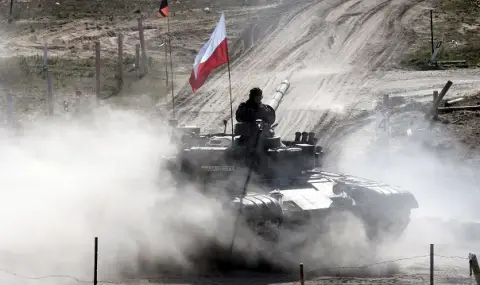Russia's war against Ukraine has thrust Poland into the spotlight as an emerging but serious player in European defense. Spending 4 percent of its GDP on defense, it is one of the few European countries to exceed NATO's target of 2 percent, writes "Chatham House".
Situated on NATO's eastern flank and with vivid memories of life under Soviet rule, Poland is aware of the threat Russia poses - to all of Europe - and has been warning allies for years. In recent months, this threat has become even more apparent as European countries grapple with increased disinformation, sabotage and arson efforts by Russia or Russian-sponsored agents.
At the same time, like the rest of Europe, Poland must plan for a medium- to long-term scenario in which the US may shift resources to the Indo-Pacific while China ramps up its belligerence in the region. Such a change will have consequences for Polish security and defense.
The central tenets of Poland's security policy are the Article 5 security guarantee provided through its membership in NATO and its bilateral relationship with the United States. Going forward, Poland will need to reconcile its historic transatlantic approach with one that maximizes EU-led initiatives to help strengthen its defense industrial capacity.
Poland can become one of the most prominent security actors in Europe. Between 2022 and 2023, its defense budget grew by 46 percent in real terms. In 2025, Warsaw plans another 10 percent increase in its defense budget. But for Poland to take a leading role in European defense and security efforts, simply increasing defense spending will not be enough. It will also need to develop a long-term strategic defense vision that guides procurement and capability development.
Poland's revised military concept of 2017 already recognized the importance of self-reliance and maximizing deterrence. It is now also increasingly turning to EU safeguards.
Since the Civil Coalition won the elections in October 2023, Poland has been one of the key countries working to raise the importance of defense on the EU agenda. Prime Minister Donald Tusk stressed the importance of joint EU defense spending, while Foreign Minister Radoslaw Sikorski advocated expanding the EU's European Rapid Development Capacity (RDC).
Poland's contribution to European defense
Poland has hosted multinational NATO battlegroups since 2017 as part of the enhanced forward presence. The US leads the battle group in Poland, another sign of its strong bilateral ties and close cooperation in various international forums as well. Poland also hosts a number of NATO bases, the most recent addition being a US-led ballistic missile defense base.
Poland has previously deployed troops as part of EU battlegroups - most recently in 2023. In July 2024, Poland, along with Germany, deployed 2,500 of its troops as part of the RDC.
As a front-line country, Poland is already an active member of the EU's military assistance mission to Ukraine, training a third of Ukraine's total of 50,000 troops. The Polish city of Bydgoszcz will now be home to a joint force training center where Ukrainian forces will be trained alongside NATO forces.
On July 8, 2024, Poland and Ukraine signed a new bilateral security agreement, which guarantees new military aid packages this year, training of the Ukrainian armed forces and close cooperation in the military industry. The agreement also includes plans to move some of Poland's arms production to Ukraine, as well as work on an agreement to intercept Russian missiles fired at Poland over Ukrainian territory - a step that will strengthen deterrence on NATO's eastern flank.
In the past, Poland has been reticent about strengthening EU defense initiatives for fear of duplicating NATO structures. Under its previous government, Poland was slow to join EU defense initiatives such as Permanent Structured Cooperation (PESCO), despite high defense spending. Polish politicians have also clashed over the failure of Poland's national arms companies to secure EU funding for ammunition production.
More recently, this attitude has begun to change, and Poland has recognized the EU's potential to complement NATO as a key pillar of European security. At the NATO summit in July 2024, Poland's defense minister emphasized the importance of harmonizing NATO and EU capabilities and acknowledged the increased contribution to funding the defense industry and capabilities.
Tough road ahead
But Poland also faces challenges. It has struggled to retain military personnel and, despite ambitious recruitment plans, has been unable to fill its newly formed military units - meaning they have not helped boost operational capacity.
A recent report by the Swedish Ministry of Defense confirmed that Poland's operational capabilities are limited by a shortage of personnel and equipment. Poland's direct military support for Ukraine has accelerated the modernization of its arsenal, but full use of new capabilities depends on delivery and training timelines.
Although its contribution to European security so far is clear and Poland is committed to taking a greater leadership role in European security, it will take several years before it can reach its full potential. This will require increased investment in the defense industry to develop capabilities and supplies, while coordinating with its European partners.
Poland's concern is that any strengthening of European defenses could come at the cost of further US withdrawal from Europe. As Poland moves to a more prominent role in safeguarding European security, it will need to balance this with efforts to maintain close relations with the US.
